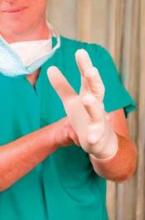A reluctance to force colleagues to cover for them and a sense of responsibility to patient care were the top reasons residents reported for work when ill, according to a survey.
Just more than half – 77 of 150 residents (51%) – said that they had worked at least once in the previous year despite flu-like symptoms. A total 24 residents (16%) said that they showed up while symptomatic at least three times.
Faculty should teach residents that not working when ill is the best and most responsible way to ensure responsible and safe patient care, Dr. Anupam B. Jena and his colleagues wrote in a research letter published in the Archives of Internal Medicine (2012; June 18 [doi:10.1001/archinternmed.2012.1998]).
Although other researchers have shown many residents work when ill, this is the first report looking at the reasons why, according to Dr. Jena of the department of internal medicine at Massachusetts General Hospital and Harvard Medical School, Boston, and colleagues from the University of Chicago.
Peer pressure and lack of an adequate system of coverage at their hospital likely fuel "presenteeism" – the drive residents feel to come to work despite illness, according to a previous report coauthored by Dr. Jena (JAMA 2010;304:1166-8).
The current findings come from a paper-based, in-person survey of 150 residents attending an American College of Physicians Illinois chapter meeting in 2010. Other findings include:
• A greater percentage of second-year residents (60%) cited patient care responsibility than first-year residents (46%).
• Women were more likely than men to cite patient care for their presenteeism (65% versus 49%).
• Women were more motivated to work while ill to avoid a perception of weakness than men (18% versus 7%).
Many residents, when sick, face a difficult decision about work. On one side of the ethical or moral equation there is a sense of duty to care for patients, remain loyal to colleagues, and display dedication to work. On the other side, residents want to avoid exposure and transmission of their illness to patients, colleagues, and staff, risks they understand well as physicians.
The high rates of resident presenteeism, the authors wrote, "highlight that the current balance of these values is in favor of coming to work while sick."
–Damian McNamara (on Twitter @MedReporter)


